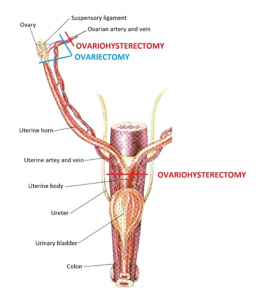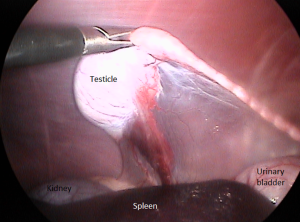At Campus Estates Animal Hospital, we know your furry loved one deserves accurate, compassionate, and effective care in their time of need. We are proud to provide minimally invasive pet surgery in Guelph for cats, dogs, and exotic pets. Our veterinary team leverages modern tools and meticulous techniques to provide your pets with quality procedures without ever sacrificing the effectiveness of the results.
We can perform a variety of minimally invasive pet surgeries in Guelph to promote your pet’s health, functionality, and overall well-being while keeping a smooth and productive recovery in mind. Our friendly and knowledgeable veterinarians offer comprehensive exams and provide you with clear information so you can make informed decisions on behalf of your pet. If you sense something is wrong, or if your pet requires an emergency visit, available 24/7, don’t hesitate to contact our office today to schedule a consultation!
What Is a Minimally Invasive Pet Surgery?
A minimally invasive pet surgery involves making very small incisions in the body where small tubes, tiny cameras, and delicate surgical instruments can carefully enter the abdomen. A smaller incision puts much less impact on the surrounding tissue, amounting to a shorter healing period, which often results in less overall discomfort for your pet.
The Benefits of Minimally Invasive Pet Surgery
Minimally invasive surgery has been used on humans for decades, but in recent years, it has become an effective surgical alternative in veterinary medicine. Our practice learned to utilize a minimally invasive approach to pet surgery because of its many advantages for your pet’s health and well-being. It can provide numerous benefits, which include, but are not limited to:
- Less pain
- Minimized bleeding
- Faster healing
- Less scarring
- Reduced chances of post-operation infection
- Decreased inflammation
- Shorter hospital stays
The following are procedures that are performed at Campus Estates Animal Hospital using minimally invasive surgery:
Spay (Female Sterilization)
 Difference between laparoscopic and traditional spay.
Difference between laparoscopic and traditional spay.
A laparocopic spay involves making 2 small incisions into the abdomen ranging in size from 0.3-1 cm in length. This is instead of a 5-10cm abdominal incision that is made for traditional spay surgeries. With laparoscopic spay it is an ovarioectomy that is performed that is the removal of both ovaries compared to traditionally ovariohystorectomy which is the removal of both ovaries and the uterus. By removing just the ovaries laparoscopically this prevents the placement of a 3rd laparoscope thus reducing surgical time and incisions for your pet. Leaving the uterus while removing the ovaries does not increase your pets risk of developing cancer of the uterus.
Cryptorchid castration
 Cryptorchidism, sometimes referred to as retained or undescended testes, is the absence of 1 or both testes from the scrotum.
Cryptorchidism, sometimes referred to as retained or undescended testes, is the absence of 1 or both testes from the scrotum.
For testicles that are still within the abdomen we use the laparoscope to locate the retained testicle(s). We are able to remove it by using the Ligasure TM vessel ligating system which provides a combination of energy and pressure to create vessel fusion. The sealed tissue is then cut and the testicle removed.
Prophylactic gastropexy (stomach tack)
Bloat-Gastric Dilatation and Volvulus (GDV) is a life threatening condition that requires emergency surgery. Large and giant breed dogs with deep chests are prone to GDV. Predisposed breeds are:
- Great Danes
- Saint Bernards
- Weimaraners
- Irish Setters
- Gordon Setters
- Standard Poodles
- Basset Hounds
- Doberman Pinschers
- Old English Sheepdogs
A gastropexy (stomach tack) can be performed prophylactically to prevent the rotation of the stomach to prevent a GDV from occurring by tacking the stomach to the body wall. Using minimally invasive surgery, a laparoscopic assisted gastropexy is accomplished with small incisions in the abdomen. This can be performed at the time of spay or neuter or anytime afterwards. We recommend this procedure for any large or giant breed dog that may be at risk.
Liver biopsy, pancreas biopsies, kidney biopsies and gall bladder aspirate
Laparocopy can also be used to gain access to the abdomen for biopsies of organs. With the laparoscope and small incisions into the abdomen allows for a quicker recovery following one of these procedures.
Cystotomy (Laparoscopic-Assisted Cystotomy)
A laparoscope can be used in 2 ways for bladder stones. First it can be placed through the urethra of female dogs to help remove small bladder stones so that an abdominal incision is not even required, or it can be used at times as a laparoscopic-assisted cyctotomy. This may help to improve visualization for those small stones aiding in their removal.
Our Extensive Process
We begin the process with an initial consultation to properly review and understand the situation. Our focused team will perform a comprehensive physical examination, carefully checking your pet from head to tail. If we conclude that we must take a deeper, more detailed look inside your pet, we will offer a laparoscopic exam. Rest assured; we will perform an exam before laparoscopic surgery to ensure your pet is ready for a successful procedure and can safely undergo sedation.
Laparoscopic surgery for dogs and cats involves viewing the internal structures of your pet’s abdomen using tiny, high-definition cameras. The tiny cameras are carefully inserted using a minimally invasive approach for lesser impact. Our laparoscopic cameras better magnify your pet’s internal health by providing a clear, real-time image to determine a thorough diagnosis. Once we’ve determined which surgical procedure is the right choice for their needs, we will utilize our specialized small tools to best yield optimal results.
Minimally Invasive Pet Surgery FAQ
We understand that you are a concerned pet parent. Our knowledgeable and friendly team is ready to answer your questions and address your concerns upon arriving at our office. Some frequently asked questions regarding minimally invasive pet surgery include:
How do I prepare my pet for surgery?
We ask that you refrain from feeding your pet the morning before surgery, as traces of food in the stomach could block our view during the examination. Food will also increase the chances of regurgitation during anesthesia.
How can I reduce my pet’s stress during recovery?
Most pets adapt quickly to their new situation after surgery. We recommend that you let them rest in a quiet and dimly lit room away from distractions. If your pet is restless for a long period of time following surgery, don’t hesitate to contact our veterinarians. We can provide tips or discuss medications to help them relax during the recovery process.
Is anesthesia safe for pets?
Anesthesia is a relatively safe sedation option used commonly in the modern veterinary world. Rest assured, our skilled staff has administered this service countless times and will carefully monitor your pet when under anesthesia.
Trusted Minimally Invasive Pet Surgery in Guelph
At Campus Estates Animal Hospital, we offer precise surgical care for your animal companion. We are a skilled team of animal lovers ready to help your pets live free from the constraints of pain and discomfort. Our animal hospital is proud to offer a broad range of procedures suitable for a variety of animals, such as cats, dogs, and exotic pets.
We are proud to perform minimally invasive pet surgery in Guelph to help your pet get back on the road to recovery as quickly as possible. We are committed to helping your pets have a future full of health, happiness, and fluid functionality for years to come. Contact us today to schedule an appointment and learn more about our services!

 We are committed to providing the highest quality of medicine within a warm and compassionate family atmosphere. We cater to the needs of our patients with a gentle hand.
We are committed to providing the highest quality of medicine within a warm and compassionate family atmosphere. We cater to the needs of our patients with a gentle hand.